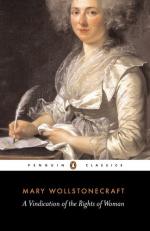|
This section contains 12,225 words (approx. 41 pages at 300 words per page) |

|
SOURCE: Blakemore, Steven. “Rebellious Reading: The Doubleness of Wollstonecraft's Subversion of Paradise Lost.” Texas Studies in Literature and Language 34, no. 4 (winter 1992): 451-80.
In the following essay, Blakemore argues that in A Vindication of the Rights of Woman Wollstonecraft engages in a radical, systematic subversion of John Milton's Paradise Lost and, further, that she subverts the feminist myth she herself creates.
In 1784 Immanuel Kant published his famous essay in which he defined “enlightenment” as man's emergence from self-imposed nonage and challenged people to begin liberating themselves by pursuing knowledge instead of relying on tradition: “Dare to know! (Sapere aude.) ‘Have the courage to use your own understanding,’ is therefore the motto of the enlightenment.”1 Kant's paradigmatic equation of childhood with ignorance and knowledge with liberation was one of the great cultural commonplaces celebrated by a variety of Enlightenment writers and repeated with special resonance by radical writers during the...
|
This section contains 12,225 words (approx. 41 pages at 300 words per page) |

|


